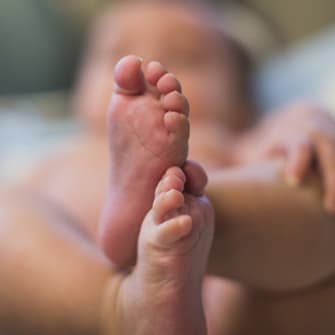
Mary Bridge Children’s neonatal follow-up clinic helps vulnerable children
Children born preterm or low birthweight — or with birth defects or other disabilities— are often at risk for developmental delays and medical challenges. To give them the best opportunity to thrive, it’s important for these children to be assessed by pediatric developmental specialists, such as those at the Mary Bridge Children’s neonatal follow-up clinic.
The clinic provides multidisciplinary care for vulnerable children up to 3 years old, with a focus on neurodevelopment. The team of pediatric specialists — a developmental pediatric nurse practitioner; physical, occupational and speech therapists; and a registered nurse care manager — design care plans to meet each family’s physical, emotional, social, financial and medical situation.
“We intentionally tailor treatment plans for every child’s unique goal, understanding that no two situations are the same,” says John Derrick, ARNP, CPNP, MDiv, medical coordinator for the clinic. “Our goal is to come alongside these families and assess the total and systemic picture of that child’s life and provide support in any way possible.”
Using Mary Bridge Children’s family-centered and multidisciplinary approach to health care, the clinic combines medical and therapeutic assessments and response. This approach optimizes life for children who might otherwise struggle to meet developmental milestones in the areas of cognitive, language, motor and social development, as well as daily living skills and adaptive behaviors.
In addition to their specialty or therapy appointments, patients are seen two to three times a year from birth until their third birthday. Special attention is given to addressing major neurodevelopmental stages, adjusting as needed for the child’s corrected age — a term that refers to the gestational or adjusted age of an infant if born preterm.
“Many times, these families just need to know that they have dedicated support to walk alongside them as they navigate their child’s health and wellness,” Derrick says. “We collaborate with multiple sub-specialty clinics and providers to build a robust team that is familiar with each patient’s situation and able to give the child the best possible outcomes. We also encourage families to stay in close communication with their pediatrician.”
In 2021, the neonatal follow-up clinic had more than 1,000 patient encounters. The clinic accepts referrals from primary care providers and pediatric specialists around the region, both within and outside of the Mary Bridge Children’s Hospital & Health Network.
For more information about the neonatal follow-up clinic at Mary Bridge Children’s, visit Mary Bridge Children’s neonatal follow-up clinic. Many families who seek care from the clinic also receive support from Mary Bridge Children’s Parenting Partnership, a donor-funded service that provides early intervention and support for families of infants born in the NICU (neonatal intensive care unit). You can support this service with a gift to the Mary Bridge Children’s Foundation.
Follow along to meet 3-year-old Patient Ambassador Carlos and learn how the Mary Bridge Children’s neonatal follow-up clinic helped him thrive.